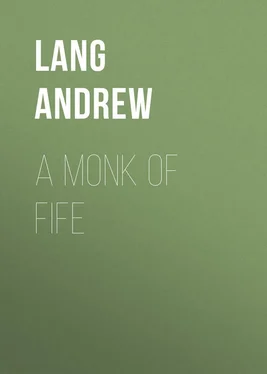Andrew Lang - A Monk of Fife
Здесь есть возможность читать онлайн «Andrew Lang - A Monk of Fife» — ознакомительный отрывок электронной книги совершенно бесплатно, а после прочтения отрывка купить полную версию. В некоторых случаях можно слушать аудио, скачать через торрент в формате fb2 и присутствует краткое содержание. Жанр: foreign_antique, foreign_prose, на английском языке. Описание произведения, (предисловие) а так же отзывы посетителей доступны на портале библиотеки ЛибКат.
- Название:A Monk of Fife
- Автор:
- Жанр:
- Год:неизвестен
- ISBN:нет данных
- Рейтинг книги:3 / 5. Голосов: 1
-
Избранное:Добавить в избранное
- Отзывы:
-
Ваша оценка:
- 60
- 1
- 2
- 3
- 4
- 5
A Monk of Fife: краткое содержание, описание и аннотация
Предлагаем к чтению аннотацию, описание, краткое содержание или предисловие (зависит от того, что написал сам автор книги «A Monk of Fife»). Если вы не нашли необходимую информацию о книге — напишите в комментариях, мы постараемся отыскать её.
A Monk of Fife — читать онлайн ознакомительный отрывок
Ниже представлен текст книги, разбитый по страницам. Система сохранения места последней прочитанной страницы, позволяет с удобством читать онлайн бесплатно книгу «A Monk of Fife», без необходимости каждый раз заново искать на чём Вы остановились. Поставьте закладку, и сможете в любой момент перейти на страницу, на которой закончили чтение.
Интервал:
Закладка:
Then he showed us a safe-conduct, signed with that blessed woman’s own hand, such as she was wont to give to the religious of the Order of St. Francis. By virtue of this, he said (and, by miracle, for once he said truly, as I had but too good cause to learn), he could go freely in and out among the camps of French, English, and Burgundians.
You may conceive how joyous they were in that poor cottage, on a night so blessed, and how Brother Thomas told us of the holy Colette, that famous nun and Mother in Christ, as he that had often been in her company. He had seen her body lifted in the air while she remained in a pious ecstasy, her mind soaring aloft and her fleshly body following it some way.
He had often watched that snow-white beast which followed her, such a creature as is known in no country of the sinful world, but is a thing of Paradise. And he had tried to caress this wondrous creature of God, but vainly, for none but the holy sister Colette may handle it. Concerning her miracles of healing, too, he told us, all of which we already knew for very truth, and still know on better warranty than his.
Ye may believe that, late and at last, Brother Thomas had his choice of the warmest place to sleep in – by the “four,” as is the wont of pilgrims, for in his humility this holy man would not suffer the farmer’s wife and the farmer to give him their bed, as they desired. I, too, was very kindly entreated by the young lads, but I could scarcely sleep for marvelling at these miracles done by one so unworthy; and great, indeed, I deemed, must be the virtue of that relic which wrought such signs in the hands of an evil man. But I have since held that he feigned all by art magic and very sorcery, for, as we wended next morning on our road, he plainly told me, truly or falsely, that he had picked up the blackened finger-bone out of the loathly ashes of the dead in the burned castle near Ruffec.
Wherefore I consider that when Brother Thomas sold the grace of his relic, by the touching of rings, he dealt in a devilish black simony, vending to simple Christians no grace but that of his master, Sathanas. Thus he was not only evil (if I guess aright, which I submit to the judgment of my ecclesiastical superiors, and of the Church), but he had even found out a new kind of wickedness, such as I never read of in any books of theology wherein is much to be learned. I have spoken with some, however, knights and men of this world, who deemed that he did but beguile our eyes by craft and sleight-of-hand.
This other hellish art he had, by direct inspiration, as I hold, of his master Behemoth, that he could throw his voice whither he would, so that, in all seeming, it came from above, or from below, or from a corner of a room, fashioning it to resemble the voice of whom he would, yet none might see his lips move. With this craft he would affray the peasants about the fire in the little inns where we sometimes rested, when he would be telling tales of bogles and eldritch fantasies, and of fiends that rout and rap, and make the tables and firkins dance. Such art of speech, I am advised, is spoken of by St. Jerome, in his comment on the holy prophet the saint Isaiah, and they that use it he calls “ventriloqui,” in the Latin, or “belly-speakers,” and he takes an unfavourable sense of them and their doings. So much I have from the learned William de Boyis, Prior of Pluscarden, where now I write; with whom I have conversed of these matters privately, and he thinks this art a thing that men may learn by practice, without dealing in nigromancy and the black magic. This question I am content to leave, as is fitting, to the judgment of my superiors. And indeed, as at that time, Brother Thomas spake not in his belly except to make sport and affray the simple people, soon turning their fears to mirth. Certainly the country folk never misdoubted him, the women for a holy man, the men for a good fellow; though all they of his own cloth shrank from him, and I have seen them cross themselves in his presence, but to no avail. He would say a word or two in their ears, and they straightway left the place where he might be. None the less, with his tales and arts, Brother Thomas commonly so wrought that we seldom slept “à la belle étoile” in that bitter spring weather, but we ordinarily had leave to lie by the hearth, and got a supper and a breakfast. The good peasants would find their hen-roosts the poorer often, for all that he could snap up was to him fortune of war.
I loved these manners little, but leave him I could not. His eye was ever on me; if I stirred in the night he was awake and watching me, and by day he never let me out of a bolt’s flight. To cut the string of his wicked weapon was a thought often in my mind, but he was too vigilant. My face was his passport, he said; my face, indeed, being innocent enough, as was no shame to me, but an endless cause of mirth and mockery to him. Yet, by reason of the serviceableness of the man in that perilous country, and my constant surprise and wonder at what he did and said, and might do next (which no man could guess beforehand), and a kind of foolish pride in his very wickedness, so much beyond what I had ever dreamed of, and for pure fear of him also, I found myself following with him day by day, ever thinking to escape, and never escaping.
I have since deemed that, just as his wickedness was to a boy (for I was little more), a kind of charm, made up of a sort of admiring hate and fear, so my guilelessness (as it seemed to him) also wrought on him strangely. For in part it made sport for him to see my open mouth and staring eyes at the spectacle of his devilries, and in part he really hated me, and hated my very virtue of simplicity, which it was his desire and delight to surprise and corrupt.
On these strange terms, then, now drawn each to other, and now forced apart, we wended by Poictiers towards Chinon, where the Dauphin and his Court then lay. So we fared northwards, through Poitou, where we found evil news enough. For, walking into a village, we saw men, women, and children, all gathered, gaping about one that stood beside a horse nearly foundered, its legs thrust wide, its nostrils all foam and blood. The man, who seemed as weary as his horse, held a paper in his hands, which the priest of that parish took from him and read aloud to us. The rider was a royal messenger, one Thomas Scott of Easter Buccleuch, in Rankel Burn, whom I knew later, and his tidings were evil. The Dauphin bade his good towns know that, on the 12th of February, Sir John Stewart, constable of the Scottish forces in France, had fallen in battle at Rouvray, with very many of his company, and some Frenchmen. They had beset a convoy under Sir John Fastolf, that was bringing meat to the English leaguered about Orleans. But Fastolf had wholly routed them (by treachery, as we later learned of the Comte de Clermont), and Sir John Stewart, with his brother Sir William, were slain. Wherefore the Dauphin bade the good towns send him money and men, or all was lost.
Such were the evil tidings, which put me in sore fear for my brother Robin, one that, in such an onfall, would go far, as beseemed his blood. But as touching his fortunes, Thomas Scott could tell me neither good nor bad, though he knew Robin, and gave him a good name for a stout man-at-arms. It was of some comfort to me to hear a Scots tongue; but, for the rest, I travelled on with a heavier heart, deeming that Orleans must indeed fall ere I could seek my brother in that town.
CHAPTER III – WHAT BEFELL OUTSIDE OF CHINON TOWN
My old nurse, when I was a child, used to tell me a long story of a prince who, wandering through the world, made friends with many strange companions. One she called Lynx-eye, that could see through a mountain; one was Swift-foot, that could outrun the wind; one was Fine-ear, that could hear the grass growing; and there was Greedy-gut, that could swallow a river. All these were very serviceable to this gracious prince, of I know not what country, in his adventures; and they were often brought into my mind by the companions whom we picked up on the grass-grown roads.
Читать дальшеИнтервал:
Закладка:
Похожие книги на «A Monk of Fife»
Представляем Вашему вниманию похожие книги на «A Monk of Fife» списком для выбора. Мы отобрали схожую по названию и смыслу литературу в надежде предоставить читателям больше вариантов отыскать новые, интересные, ещё непрочитанные произведения.
Обсуждение, отзывы о книге «A Monk of Fife» и просто собственные мнения читателей. Оставьте ваши комментарии, напишите, что Вы думаете о произведении, его смысле или главных героях. Укажите что конкретно понравилось, а что нет, и почему Вы так считаете.












